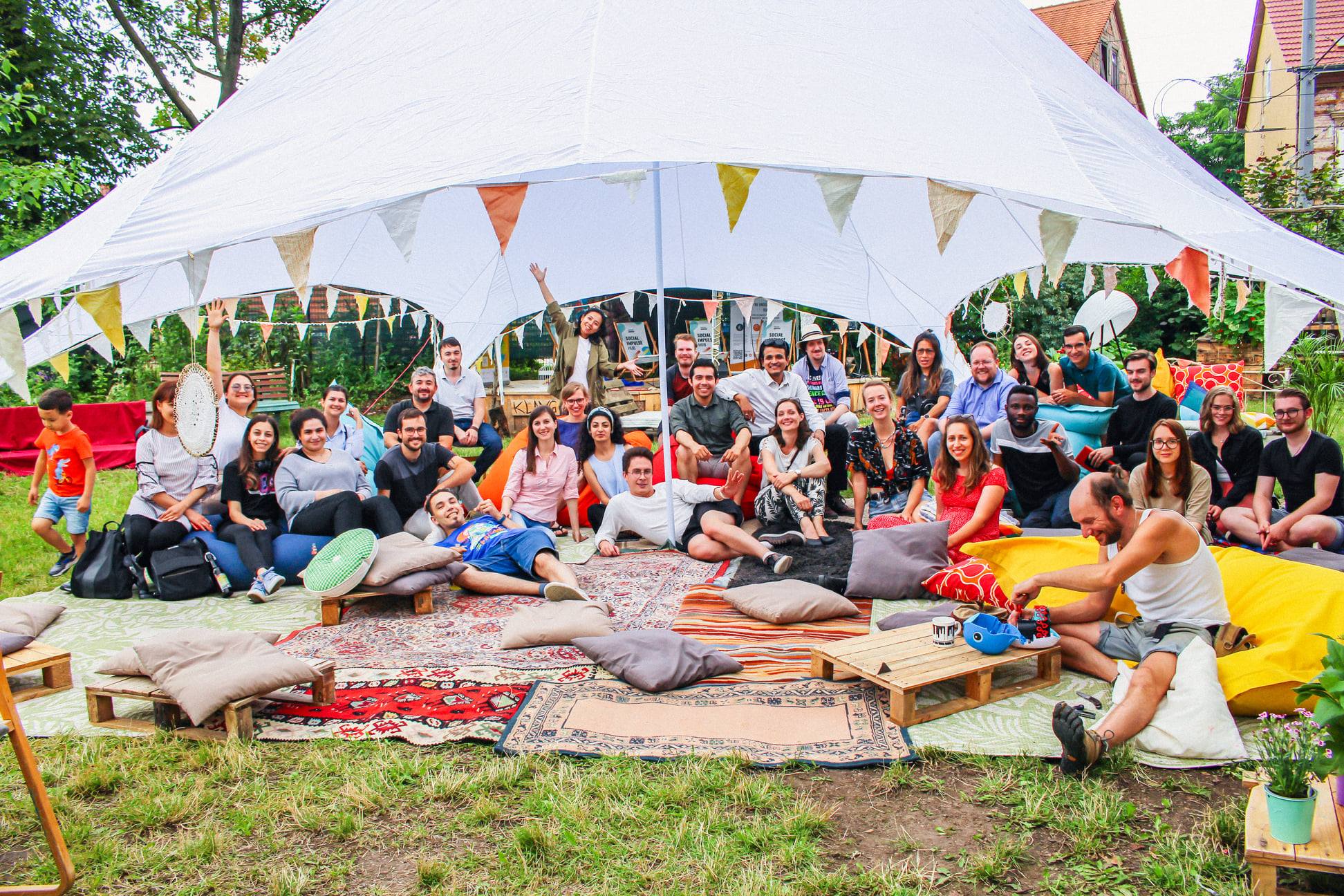In today’s interconnected world, cultural dimensions play a pivotal role in shaping and driving social innovation. By embracing the unique values, traditions, and experiences of diverse communities, social innovation can address local challenges in more inclusive, impactful ways. This article highlights two initiatives supported by CGE Erfurt e.V. and Plattform e.V. through the Interreg Central Europe project TASK4COME, a forerunner to TASK4ISI, showcasing how cultural perspectives enrich and transform communities.
Culture influences social innovation in several ways. It fosters creativity, connects people through shared identities, and builds a sense of belonging. In diverse communities, cultural aspects can also provide innovative solutions to local challenges. By embracing cultural diversity, social innovators not only address social issues but also celebrate and preserve cultural heritage.
Case Study 1: Choyxona Do’stlar – A taste of Uzbekistan in Erfurt
One standout example is Choyxona Do’stlar, a freshly opened bistro offering an Uzbek-inspired kitchen, founded by Asolatkhon Usmanova with her friends and partners. Located in the north of Erfurt, the bistro literally translates from Uzbek as ‘Friends’ and was born out of a passion for sharing Uzbek culinary traditions with the local community. Initially incubated during the Social Impulse Academy, the project took shape over time with support from local partners like CGE, IWM GmbH, ZLG e.V. and Plattform’s Werkhaus Inclusion program.
Choyxona Do’stlar not only diversifies the local food scene but also fosters cross-cultural understanding and appreciation. The space often hosts events, culinary workshops, participates in city-wide culture festivals, creating a culinary experience that resonates with both the Uzbek community and new audiences. It transforms heritage into a platform for entrepreneurship, where culture becomes both the product and the inspiration.
Follow on Choyxona Do’stlar’s journey and mouthwatering dishes on Instagram: @dostlarerfurt.
Case Study 2: Haus der Amerikas e.V. – Building bridges across continents and cultures
Inspired by the vision of Ruben Gonzalez and Celene Mujica and established in January 2021 during the TASK4COME Social Impulse Academy, the Haus der Amerikas association serves as a hub for people from North, Central, and South America, the Caribbean, and anyone with an interest in the Americas. Its mission is to foster integration while celebrating the diverse art, culture, and identities of the region.
The organisation’s diverse activities, from language classes and crafting sessions to salsa nights and the largest in Erfurt Latin open-air festival “La Verbena”, celebrate the rich heritage of the Americas while fostering mutual understanding within the local community. By blending cultural preservation with innovative approaches to social inclusion, such as sports programs for youth and family dinners showcasing traditional cuisines, Haus der Amerikas connects people across cultural divides. Its initiatives empower migrants to navigate their new environment, preserve their identities, and actively participate in society, demonstrating how cultural heritage can be a powerful catalyst for social cohesion and community development.
Learn more about Haus der Amerikas on association’s website (About Us) and on Instagram @hausderamerikas.erfurt.
Both ‘Choyxona Do’stlar’ and ‘Haus der Amerikas e.V.’ originated during the TASK4COME Social Impulse Academy, which offered participants for over five months in 2020-2021 a structured environment to refine their ideas, acquire entrepreneurial skills, develop and pilot their plans. These foundational supports enabled initiatives to move beyond the concept stage, overcoming common barriers faced by early-stage social entrepreneurs.
While the Academy laid the foundation, its limited duration meant that many first-time entrepreneurs required additional time and extended support beyond TASK4COME project to fully develop their ventures, achieve milestones like official registration, and secure operational spaces. Plattform’s Werkhaus Inclusion program seamlessly followed the Social Impulse Academy, engaging many of its graduates, including Asolatkhon, to maintain their enthusiasm and provide the mentoring and resources needed to continue developing their ideas into sustainable initiatives.
Networks also proved crucial in fostering these cultural ventures. Community of supportive organisations and individuals not only offered moral backing but also served as early patrons and advocates. CGE actively engaged with ‘Haus der Amerikas e.V.’ by participating in events like ‘La Verbena’, offered ongoing guidance and assistance with fundraising, and supported ‘Choyxona Do’stlar’ through catering collaborations.
Notably, in a region like Thuringia, where diversity is less pronounced and international residents are fewer compared to other parts of Germany, initiatives supporting entrepreneurs with international roots must address inclusion barriers such as language and cultural differences. The open-minded and multicultural teams at CGE and Plattform were instrumental in creating a supportive environment that empowered migrant entrepreneurs to thrive. This highlights the importance of adopting inclusive approaches in business training and mentoring programs — an area where other business support providers could significantly enhance their efforts by embracing diversity and fostering inclusion. Such initiatives not only empower entrepreneurs but also enrich the wider community, fostering intercultural collaboration and understanding.
The stories of Choyxona Do’stlar and Haus der Amerikas illustrate how cultural context can serve as a powerful foundation for social innovation. By leveraging their unique cultural backgrounds, the founders addressed specific community needs — culinary diversity and intercultural dialogue — thereby enhancing social cohesion. Such culturally rooted projects demonstrate that social innovation thrives when it resonates with the community’s cultural fabric.How might your community harness cultural diversity to drive social change? Share your thoughts and join the conversation!
This publication reflects the views of the author(s) only. The programme authorities are not liable for any use that may be made of the information contained herein.
